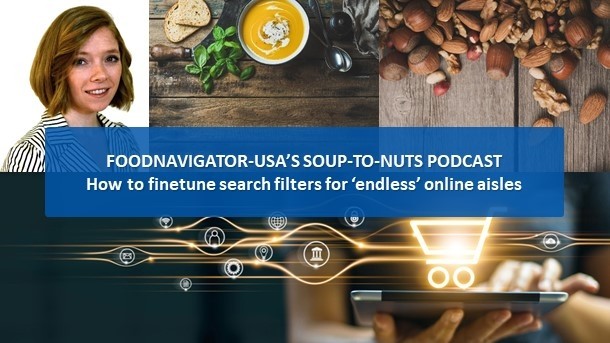Soup-To-Nuts Podcast: Finetune search filters to deliver ‘endless,’ not ‘empty,’ online shelves

But according to an audit of 30 top retailers recently conducted by Label Insight, most online shopping experiences fall woefully short of the promise proffered by “endless aisles,” and instead, perpetuate the frustration of “empty aisles.” According to Label Insight CEO Todd Morris, this failing is not due to shortfalls in retailers’ assortment, but rather their search filters.
In this episode of FoodNavigator-USA’s Soup-To-Nuts podcast, Morris explains why retailers now more than ever before need to improve their online mix to include more lifestyle and need state products, as well as make them easier for consumers to discover. He also outlines the top hurdles to e-commerce shopability and offers solutions to better engage consumers and increase revenues for the long-term.
[Editor’s Note: Never miss another episode of FoodNavigator-USA’s Soup-To-Nuts podcast – subscribe today.]
200 million Americans seek specialty health & wellness products
According to Label Insight’s recently published report, Empty Aisles: The Grocery E-Commerce Shopability Audit, “an estimated 200 million Americans follow some type of health and wellness program and an estimated 180 million Americans have food allergies that affect the way they shop.”
At the same time, the pandemic has fueled trial and adoption of online grocery shopping with a whopping 46 million people in the US in June 2020 using ecommerce as a way to reduce risk of exposure to the coronavirus.
But, based on Label Insight’s report, Morris notes, the online shopping experience for many people seeking products that are allergy-free or comply with a specific diet is far from ideal.
“We looked at the top 30 retailers and we looked at the top 25 most searched for attributes. Unfortunately, what we found is that instead of being endless aisles, mostly they were empty. Ninety-two percent of the products that should have been appearing for the consumer search were actually not visible. And, so it really just highlights how hard it is if you have an intolerance or an allergy or a specialty diet to actually fill your basket in today’s online grocery world,” Morris said.
One of the main reasons for the disconnect include many retailers are still struggling with the basic operational challenges of ecommerce and fulfillment and, therefore, haven’t had a chance to finetune their search features, Morris notes.
Another barrier is that most retailers don’t have the underlying data to tag main attributes, he adds.
And finally, Morris suggested, on a lesser scale retailers still don’t fully appreciate the scope of consumer need for specialty products or the prevalence for which they shop based on health and wellness
Health & wellness are no longer niche
As Morris notes and Label Insight’s report makes clear, grocery shopping based on lifestyle choices and wellness is no longer niche and not something that retailers can ignore or consign to other channels.
“This is very much mainstream. … The number of people who are actually on an active diet or health regimen has topped 200 million shoppers. So basically, we’re talking about the lion’s share of people,” he noted. “The problem is that there are infinite number of need states. Everyone is not the same. Everyone has a unique allergy or intolerance or health program. So, it’s growing more complex every day.”
Indeed, Label Insight’s audit revealed 64% of shoppers follow a diet or health-related wellness program, up from 49% in 2018. In addition, 55% say allergies or intolerances influence their purchases, which is up from 44% in 2018.
Capitalizing on this growth, however, is, as Morris noted, ‘complex,’ in large part because consumers are not searching for branded products that they know meet their dietary requirements. Rather, Label Insight found 81% of grocery searches on Amazon are unbranded – illustrating consumer desire for discovery and a need for brands and retailers to more clearly communicate their attributes.
However, according to Label Insight’s research, efficiently and consistently identifying and processing these attributes is a significant pain point for retailers.
The audit revealed that while most retailers have attribute-driven filters to aid discovery, there is a mismatch between what filters retailers and consumers use. For example, the audit found, “of the top 25 attributes consumers organically searched for online over the past 52 weeks, only 14 shopped up within the top 25 search filters on retailers’ websites.”
In addition, the report found most retailers fail to include attributes with the highest organic search volume and even when they do have advanced filters that align with consumer searches, they still fail to return 53% of qualifying products.
One of the reasons that retailers’ filters come up short is because their product data is incomplete. Many rely on the brand or product name to flesh out search results, but unless the attribute is in the title of the product it won’t come back in the search results.
“As we know, you can’t have every attribute in every brand name,” Morris said.
He added, this is where Label Insight can help, by providing enriched and complete product data with all applicable attributes to improve the accuracy and completeness of search results, Morris added.
“At Label Insight, the key thing we provide is the ability to tag all of the products that meet that need state without the brand having to do any work or the retailer having to do any work,” he said.
Enriching data is just as important as refining fulfillment logistics
Enriching data and improving filters may feel like a lower priority to some retailers who are trying to prop up click-and-collect or even the most basic online shopping options to meet growing demand for ecommerce during the pandemic. But, Morris argues having efficient filters and properly labeling product attributes is essential because they improve recommendations and replacements – a pain point that has grown during the pandemic as more people order online and do not have transparency into what is in stock.
For example, Morris notes, many consumers are frustrated when a product they order is out of stock and replaced by something that may on the surface appear similar but which has none of the same health attributes. This can prompt consumers to tell shoppers not to replace items when they are out of stock, which lowers the basket ring.
Similarly, enriched data can help retailers better recommend similar or complementary items to online shoppers, such as salsa when corn chips are added to the cart. On point recommendations can significantly increase total ring.
Finally, improving attribute labeling and enriching search data also can help retailers better identify what promotions to run when and when not to a run a promotion.
Brands need to improve labeling, too
The failure to connect specialized products with consumers actively seeking the attributes they offer isn’t all on retailers – brands also can improve how they describe or tag their products to boost sales and consumer engagement.
“For a brand to be discovered … the first [step] is they’ve got to make products that are on trend and meet the consumer need. Label Insight helps many of them track what are those trending attributes that change they way that they make products,” Morris said.
Similarly, Label Insights can help brands identify attributes that fit with their product but which they have overlooked. For example, labeling chicken as keto helped drive up one producer’s sales 35%.
Retailers and brands that want to learn more about how Label Insight can help improve their shopability can learn more at www.labelinsight.com, and Morris offered to connect those who reach out to him on LinkedIn or through the website with a customer service team to walk them through the company’s services.










